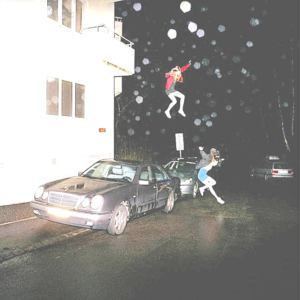By Thomas Infante
Managing Editor
I had given up hope years ago that Brand New would ever release a new album again. The indie/emo rock band enjoyed moderate success and developed a strong cult fan base throughout the 2000s when it released four albums that each took the group’s music in a different direction. After the mixed reception of its last album in 2009, “Daisy,” the band stuck to touring and avoided answering questions about future material.

Despite their absence, the members of Brand New have come back with some of their strongest material on their fifth album, “Science Fiction.” The band released the album with no promotion on Aug. 18, surprising fans by becoming the first album by the band to reach No. 1 on the Billboard top 200. While other bands from the same era, like Fall Out Boy, had to turn completely pop to achieve the same success, Brand New’s music retains its distinctive dark atmosphere without retreading old territory.
“Science Fiction” is noticeably mellower than any of the band’s previous work. Some of the band’s most famous songs rely on heavily distorted guitars and the ferocious screaming of lead singer and lyricist Jesse Lacey. This album takes a more reserved and minimal approach on many songs, including the opening track “Lit Me Up.” The vocals and instruments echo hauntingly throughout the song, and Lacey’s cryptic vocals about being lit on fire fit well with the vibe of the music.
The song “Waste” incorporates an acoustic rhythm guitar to complement a distorted lead electric guitar. Lacey’s lyrics sound regretfully directed at an old friend who is living in the past, or as Lacey puts it, “stuck in the waste.” Lacey pleads with this individual to let go of a past burden and move on.
The following track, “Could Never be Heaven,” is an intimate finger-picked acoustic ballad, a very unusual choice for a band that once heavily favored loud noise and power chords. Lacey’s lyrics seem to contemplate his place in heaven after many past misdeeds.
Not all the songs on “Science Fiction” are such a musical departure for Brand New. The track “Can’t Get it Out” features the distorted power chords and anthemic chorus that immediately call back to the band’s pop-punk roots. It’s by far the most familiar sounding song on the album, but among the more down tempo tracks of “Science Fiction,” it actually stands out.
The bulk of the great tracks are in the middle of the album, beginning with the song “Same Logic/Teeth.” This track reaches both extreme ranges of Brand New’s musical capabilities, with a chorus that starts with pretty, harmonized vocals and ends with Lacey’s most intense screaming on the album. His lyrics are striking and poetic, examining the problems that arise from unchecked mental trauma.
“This is the same logic that got us into trouble the first time, when we discovered we could use,” Lacey croons on the chorus. “The same logic to get us out of trouble and shake off all the people we abuse.”
Like most of the songs on this album, the lyrics are pretty depressing, but the music itself never sounds sad.
The song “In the Water” is similarly captivating, with a bluesy rhythm guitar riff running behind Lacey’s prophetically delivered lyrics about life and the passage of time.
Lacey frequently uses water as a symbol of death, but here it seems to function as a portal to the afterlife, a place to heal wounds and find answers to the unanswerable. Plus there’s a sweet guitar solo before the last chorus, and that’s always welcome.
The track is followed by another excellent song, titled “Desert.” Lacey’s lyrics on this song are from the point of view of an older white Christian American, who feels infringed upon by an ever-changing society.
The narrator denounces “bleeding hearts” and homosexuals, insisting that in the event of a divine judgment, he would be safe from damnation — hence the chorus, “don’t come running to me when they’re coming for you.” It also shows how an apathetic opinion on popular social issues contributes to the issue as a whole. The lyrics here are clever enough that one could listen to the song several times without even hearing any social commentary.
The remaining songs are all solid, but don’t hold up as well compared to the album’s central tracks. The song “Out of Mana” features quiet verses that build to explosive choruses, and finally to the best guitar solo ever recorded in a Brand New song.
“137” has some cool guitar work, but Lacey’s lyrical allusions to the apocalypse are by far the most contrived on the album.
“No Control” and “451” are both pretty good, but seem underwhelming and repetitive after so many other outstanding songs.
The album ends with the track “Batter Up,” a somber song with an American Football-esque guitar melody running throughout. Lacey’s lyrics seem to dwell on the permanence of depression (“it’s never going to stop”), as well as his ability to overcome it (“batter up, give me your best shot”).
In addition to numerous references to past lyrics and songs by the band, there are also several production choices that add insight to his lyrics.
The album opens with a recording of a woman in therapy who talks about a dream she had of being at a crowded convention, and though “I don’t mind having all this going on inside of me… I think I’m going to be relieved when it’s over.”
This, along with several other lyrics on this album, suggests that “Science Fiction” may be the last album that Brand New releases together.
If this is indeed the case, then I’m just glad that one of the greatest bands of the 21st century got another chance to solidify its status as such with some of its best material to date. The band that so long ago promised to stay 18 forever has finally grown up.







